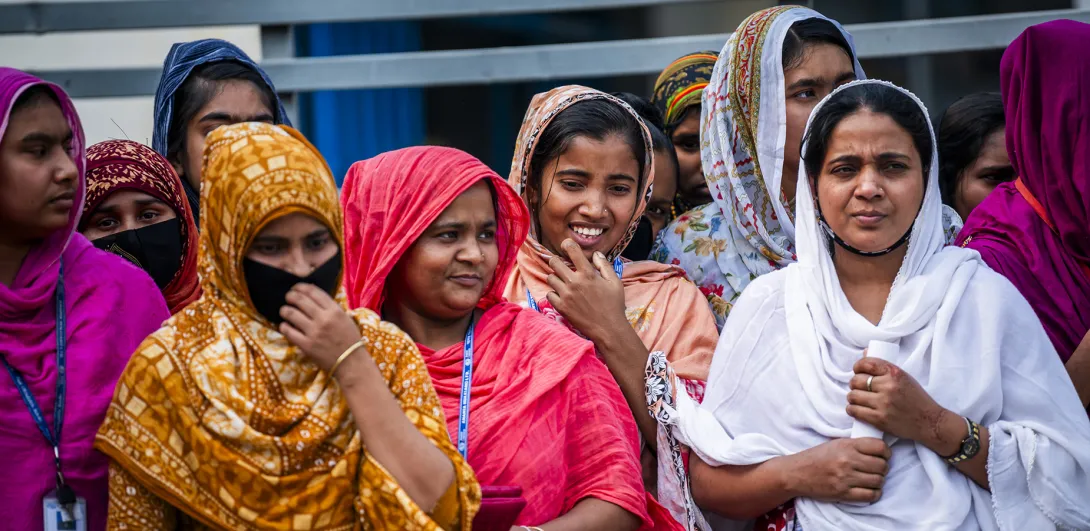Share the page
With Proparco, gender equality is moving centre stage in the Bangladesh textile industry
Published on
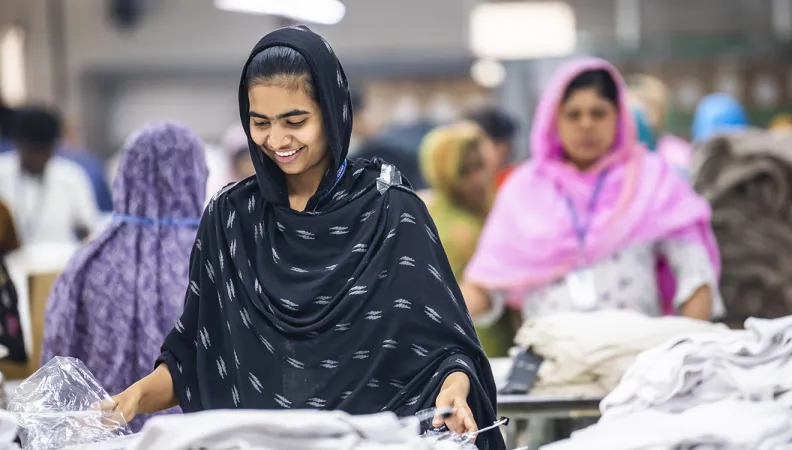
In Dhaka – the hub of global textile production – Proparco is partnering with a major player in the sector in an innovative way. As well as creating permanent jobs in an industry dominated by seasonal employment, a highly original technical assistance programme financed by Proparco is improving the health and education of employees. It's a win-win solution: the company benefits from healthier and loyal female employees who are less likely to be absent from work. We report from the Ananta plant, where 1,112 women have received training through the RISE legacy programme HERhealth.
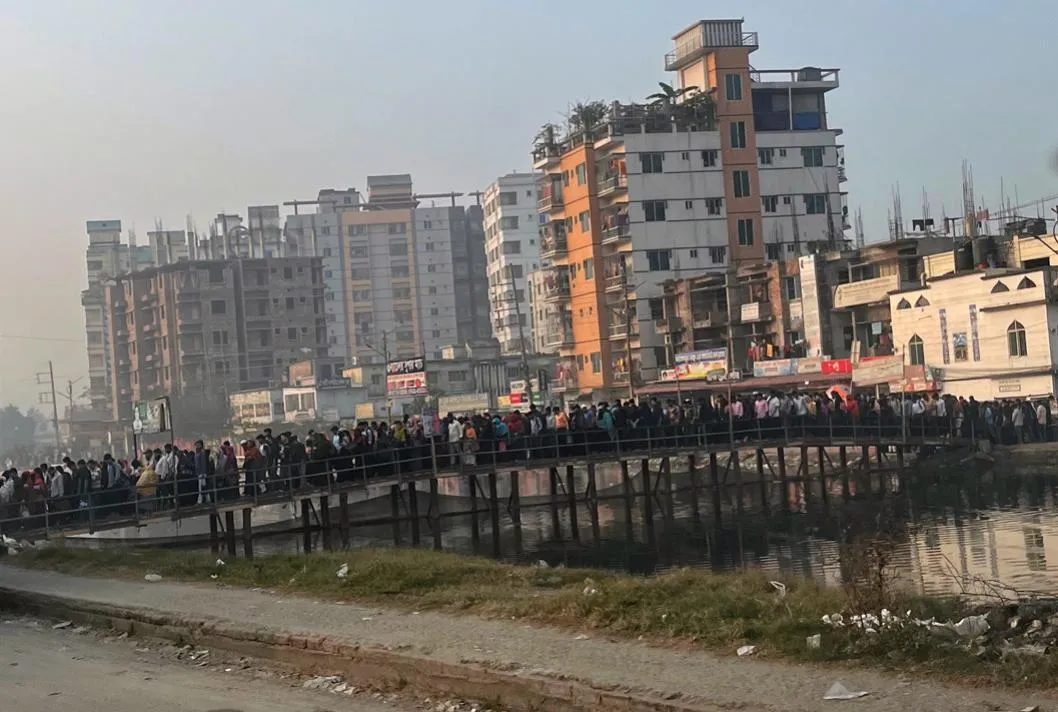
It’s seven o'clock in the morning in the southern suburbs of Dhaka, home to 22 million people. What will very soon become incessant honking is just beginning to crank up, under the still gentle glow of a grapefruit-coloured sun. Long, colourful columns of workers – mostly of them on foot – are making their way to work.
Women make up a large proportion of the workforce. Several thousands of them converge on the premises of Ananta, which will shortly open its third building, bringing its workforce up to 5,000, including 2,000 women. On this single sewing and quality control production line, 900 people, mainly women, work on 690 machines.
Enormous blue skips lining the gleaming aisles are being filled with Ananta's single speciality: mid to high-end segment “small top" pullovers and the like, destined for the shelves of European stores.
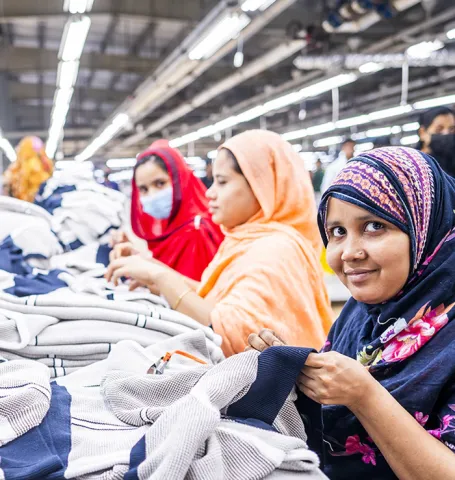
Ananta can produce, package and deliver its wares from the huge port in the south of the country to European boutiques for any order placed 90 days in advance. And it does so in massive volumes: "We can produce up to 45,000 pieces a day here", explains Niffari Nissar, CEO of Ananta Huaxiang Limited (AHL), without batting an eyelid.
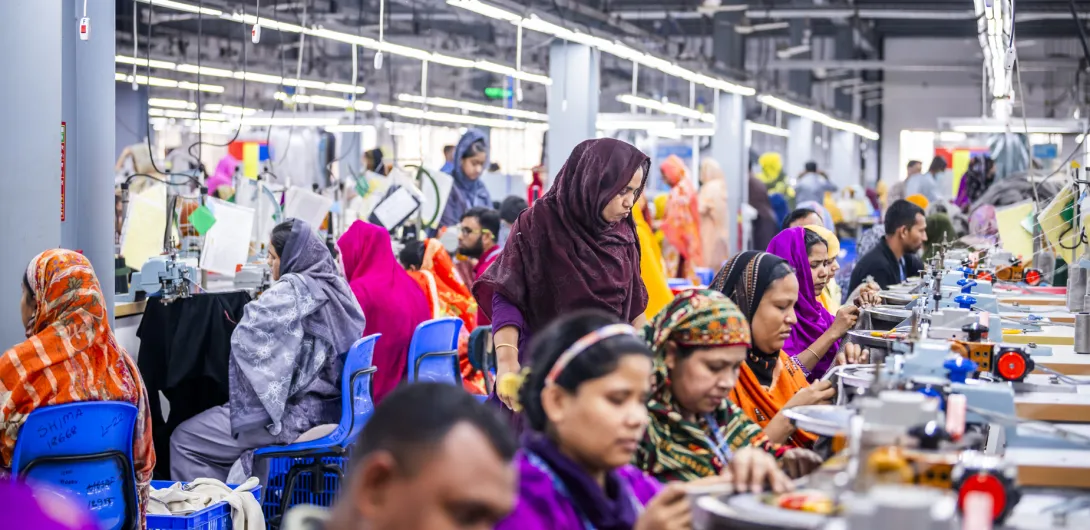
It will soon be time for lunch, subsidised by Ananta, which has a reputation for offering better working conditions and higher wages than the industry average. This is a welcome development, especially for the women working at the site: in the textile industry, they often have to contend with very long working hours and low pay. Worse still, according to a study by non-profit organisation ActionAid International, 80% of female textile workers in Bangladesh have been confronted with sexual violence or harassment in the workplace.
Gender equality – a strategic priority for Proparco
It was against this backdrop of a proactive company policy in terms of women’s rights that Proparco arranged its financing in December 2021, gender equality being one of Proparco's three strategic priorities. To reinforce this objective, the USD13.8 million senior loan granted to Ananta over a total period of ten years was rounded out by a specific technical assistance programme worth USD16,000: deployment of the BSR’s HERhealth programme in partnership with local NGO Change Associates for roll out of trainings within the company itself. HERhealth is now part of the initiative RISE. 1,112 female employees at the plant were reached by programme activities between June 2022 and September 2023.
HERhealth, contributing to gender equal and healthy behaviours for working women
RISE aims to empower women workers, embed gender equality in business practice and catalyze systems change in global garment, footwear and home textiles supply chains. In the case of Ananta, the RISE legacy program HERhealth focused on promoting gender equality by focusing on female employee health. This was done mainly through awareness-raising and training provided to employees by 56 “peer educators”, workers chosen from among their ranks.
Good for women...and good for business too
The training initiatives covered a wide range of pre-identified needs that concern women textile workers in Bangladesh (see insert for more details): personal and menstrual hygiene, family planning and maternal health, screening for diseases (HIV, cancer), nutrition and healthy eating, improved workplace health facilities, more balanced sharing of domestic tasks at home, etc. A baseline survey was conducted to confirm the most pressing needs and prioritize training modules accordingly.
These are all part of Ananta's commitment to its female employees and are intended to generate a broader positive impact on the quality of life of the most vulnerable female workers, as well as on the sustainability of the initiatives being deployed. These achievements are intended to last into the long term – long after programme deployment. The benefits for the employer are obvious: employees that enjoy better health, status and daily lives means less absenteeism, lower staff turnover and healthier, better-trained and more confident employees who are less prone to workplace accidents.
Momena Akter, 26 years old
From her impeccably neat studio apartment, where she lives with her twelve-year-old brother, her three-year-old daughter and her husband – who is also an Ananta worker – Momena Akter is really eager to talk about the benefits of HERhealth:
“Thanks to this programme, I now know the importance of sanitary towels and the best way to use them. I'd never been to the doctor before. I didn't dare go and I thought it was too expensive, so I made do with the pharmacy.
I also learnt about best practices when you're pregnant. I know that you should give birth in a hospital rather than at home.
Everyone at home now washes their hands all the time and we drink purified water. The health benefits were immediate, with a marked reduction in diarrhoea. At the factory, as one of the HERhealth "peer educators”, I have been able to train around 60 people – mainly women, but men as well.
Just like me, I know that they have passed on this knowledge to their families. These are really important lessons that will serve us well for the rest of our lives."
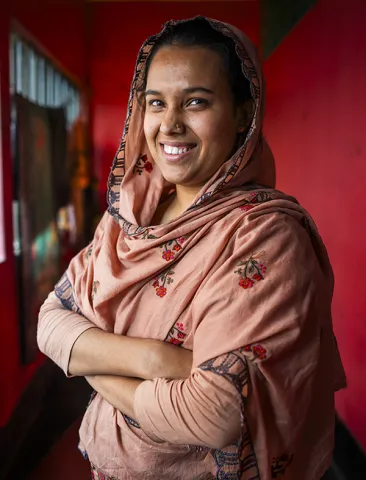
Kaniz Fatema, 22 years old
Fresh fruit and sweets for the day's visitors are piled up on the bed in the living room of Kaniz Fatema's comfortable four-room home. The young woman lives here with her brother, sister, mother and husband.
“As soon as I heard that we could join the HERhealth programme, I couldn't wait to get started", smiles Kaniz. "I learned that a full breakfast every morning is really important.
At the factory, we start work at 7.30 in the morning, for 8 hours, and up to 5 hours overtime - with double pay - during busy periods. A lot of us used to feel unwell during the day, with headaches, stomach aches and general fatigue because we hadn’t eaten enough in the morning.
Since HERhealth, less people have been off sick and we work more effectively. In our family, we've also added vegetables to our diet, which wasn't the case before.
A lot of workers who hadn't followed the programme came to see me spontaneously, including their line managers, to find out more. Men came to see me to get advice on sanitary towels for their wives or sisters.”
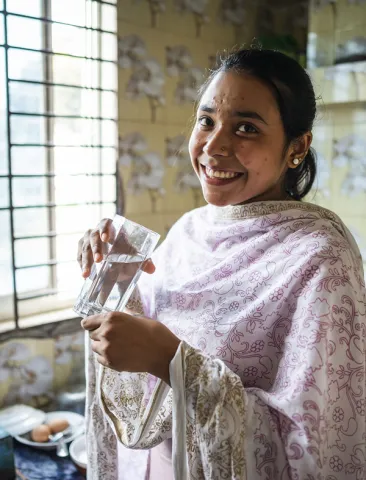
Rita, 23 years old
In the aisles of Ananta, Rita is a respected worker: despite her young age, she supervises 14 people. For Rita, HERhealth is first and foremost the story of a life saved:
"Because of poor menstrual hygiene, a colleague was taken ill and increasingly exhausted. But during the HERhealth programme, I learnt to recognise certain signs that could indicate the presence of cancer and these symptoms were very similar to those that my colleague had. I told her to go and see our doctor. And the tests did indeed reveal cervical cancer – fortunately at an early stage.
Following effective medical treatment, my colleague is now completely cured. I'm so happy to have been able to help this woman.
I've also learnt a lot of other things that I've passed on to my colleagues, family and friends, such as the importance of a balanced diet, or the need to do specific physical exercises to protect our backs.”
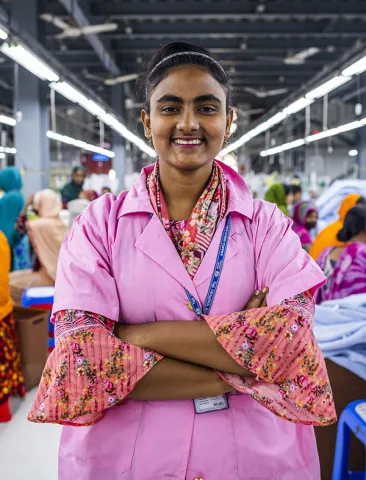
Dr Kazi Sohana Yeasmin, 34 years old
Working out of a building that is easily accessible and visible to all, just to the left of the main building entrance, the factory doctor sees a real difference between before and after HERhealth:
"Yes, I definitely see more patients now than before the programme. The women dare to come now, and that makes all the difference.
I can see that they are very well briefed on essential matters such as contraception, the importance of vaccinations, disease prevention, menstrual and general hygiene, water quality and nutrition.
HERhealth has also provided us with more resources. We now have medical staff on site 24 hours a day, because at peak times, teams work here at night.
In addition to the ambulance already available and the nearby hospital, we now have two nurses, compared with just one previously.”

Niffari Nissar, 47 years old
At the head of a giant enterprise of almost 5,000 employees, 40% of whom are women, Niffari Nissar works out of a simple glass office on the ground floor of the Ananta building. This astute entrepreneur, originally from Sri Lanka, quickly understood the importance of looking after his employees, especially the female workers, for whom the needs were greater.
"Our partnership with Proparco, RISE and Change Associates is really positive for everyone. Healthier, better informed and happier employees are a good thing in itself but it also means higher quality work, less absenteeism, less turnover and less time needed to train replacements.
Another very important aspect that is often overlooked is the importance of relations between people. When you're part of what can be compared to a small city, it's vital to have good interpersonal relations, underpinned by greater equality and respect between colleagues.
Moreover, giving responsibility to peer educators - there were 56 of these to promote the HERhealth message throughout the company - also reveals talent and strong personalities have emerged thanks to this programme.”
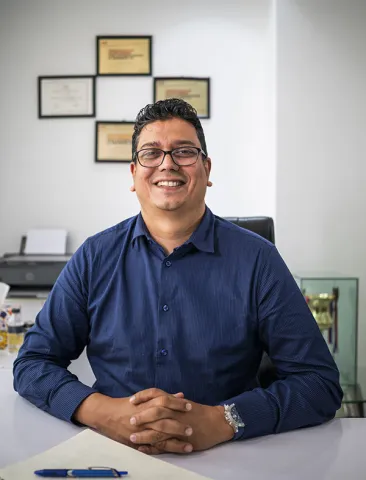
Ananta + Proparco + RISE: remarkable concrete results
With the RISE legacy programme HERhealth and an ambitious Environmental and Social Action Plan (ESAP) – both supported by Proparco – Ananta has been pro-actively caring for its employees, thanks especially to training provided during working hours.
Impacts generated by RISE legacy program HERhealth:
- 100% of Ananta workers trained as part of the HERhealth programme now wash their hands when necessary, compared with 50% before the programme was launched. A basic hygiene reflex with major health benefits.
- Ananta workers' awareness of AIDS and HIV has improved: at the end of the programme, 84% of employees involved in HERhealth stated that they were ready to take a HIV/AIDS screening test, compared with 44% before.
- Employees involved in the programme also had improved knowledge of the symptoms of breast and cervical cancer. After the training, 92% of the employees surveyed knew how to perform a breast examination themselves.
- 100% of workers surveyed at the end of the HERhealth programme drank purified water all the time, compared with only 14% previously.
- During menstruation and when they don't have access to proper sanitary towels, 100% of female workers now use napkins instead of scraps of clothing from the factory, or even cloth/fabric from home. 94% of female workers now change their menstrual hygiene products three to four times or more every day, compared with 34% before training.
- 58% of workers who received training now use modern family planning methods.
- At the end of HERhealth, 100% of women said they would have to breastfeed their child exclusively for only six months, compared with 48% previously.
- After they took the programme, none of the workers would seek out a traditional healer as a midwife, whereas 36% of the women previously wanted to do this.
- The workers who took part in the programme are now familiar with recommended postures in the workplace: they reported a 12% reduction in work-related physical pain at the end of their training.
- Self-esteem and self-confidence – which are often neglected but are mentioned by the majority of employees as being a problem – have improved significantly: 50% of the women who received training said that they now have a positive attitude towards themselves. Indeed, 100% now feel confident enough to raise a problem with a manager.
Impacts generated by the Environmental and Social Action Plan (ESAP):
- Increasing the number of women in supervisory roles and commitment to promoting more women to management positions,
- Raising awareness of gender bias in the recruitment process,
- Obligation to reduce overtime and include employee grievance and representation processes,
- Average salaries are higher than minimum salaries in the region (no piecework rates, for example),
- Better compliance with fire and building safety regulations,
- Training security staff to recognise and respond to situations of sexual harassment,
- Including gender-based violence in grievance procedures.
Qualification for the “2x Challenge” gender equality programme as part of a committed partnership
The introduction of RISE leagy programme HERhealth as part of the technical assistance package provided the springboard for qualifying for the “2X Challenge” by Proparco.
Although the project was not initially eligible, Ananta liaised proactively with Proparco to secure this qualification. The investment in Ananta therefore complied with criterion 3 of the label (Employment) based on the number of women employed, i.e. 40% of the plant's workforce.
The deployment of HERhealth also demonstrated a strong qualitative commitment to improved working conditions for women. In addition to the impacts described in our article, Proparco's partnership with Ananta is also helping to create 2,400 permanent jobs in a sector that is traditionally affected by seasonal employment.
